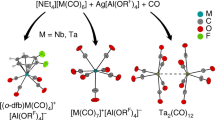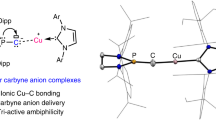Abstract
WE are able to report the isolation of copper carbonyl, which we obtained from the reaction of carbon monoxide with heated cuprous oxide. It is a white, readily sublimable solid, the vapour of which is dissociated at a higher temperature with the consequent deposition of metallic copper. Only small quantities are formed, but enough has been collected to afford a preliminary analysis indicating Cu(CO)3 as the empirical formula. A polymeric form would be expected in the case of copper, and its properties suggest that it is very possibly dimeric.
This is a preview of subscription content, access via your institution
Access options
Subscribe to this journal
Receive 51 print issues and online access
$199.00 per year
only $3.90 per issue
Buy this article
- Purchase on Springer Link
- Instant access to full article PDF
Prices may be subject to local taxes which are calculated during checkout
Similar content being viewed by others
References
Bertrand, C.R., 177, 997 (1923).
Zelinski, C.R., 177, 1041 (1923).
Mond and Heberlein, J. Chem. Soc., 125, 1222 (1924).
Boomer, Martin and Argue, NATURE, 129, 438 (1932).
Pearson and Robinson, J. Chem. Soc., 652 (1932).
Author information
Authors and Affiliations
Rights and permissions
About this article
Cite this article
ROBINSON, P., STAINTHORPE, K. Two New Carbonyls: Copper and Tellurium. Nature 153, 24–25 (1944). https://doi.org/10.1038/153024b0
Issue Date:
DOI: https://doi.org/10.1038/153024b0
This article is cited by
-
The ‘Volatile Copper Compound’ and its Effect on the Beilstein Test
Nature (1951)
-
Evidence for the Formation of a Copper Carbonyl
Nature (1947)
-
Copper Carbonyl: a Correction
Nature (1944)
Comments
By submitting a comment you agree to abide by our Terms and Community Guidelines. If you find something abusive or that does not comply with our terms or guidelines please flag it as inappropriate.



